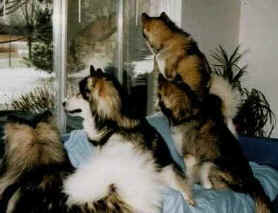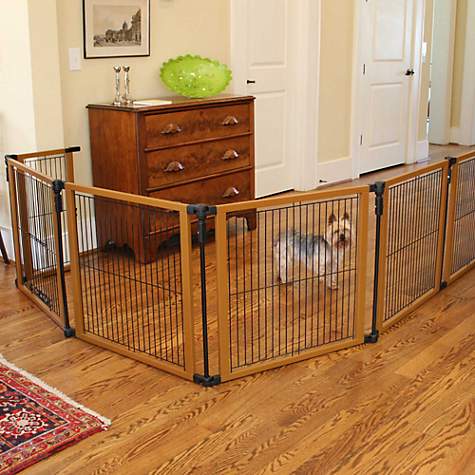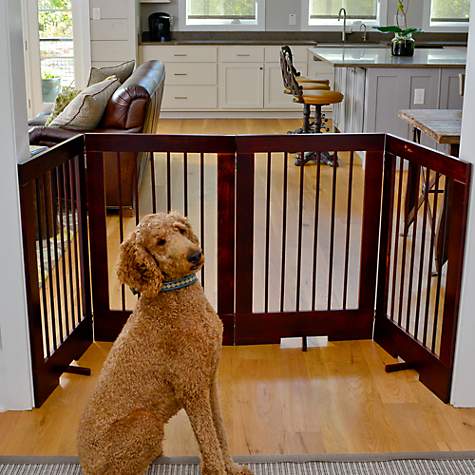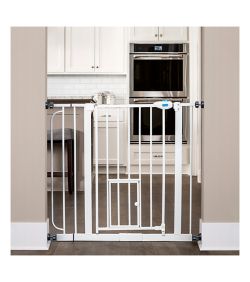Fighting and Sibling Rivalry
between similar aged and same sex dogs
I've said it before, and I'll say it again. To those of you that don't believe me, or anyone, Malamutes generally do not get along with own sex. Yes, there are exceptions (Mula, Jazzy, Mocha, and few others are the exception) but it is unusual and very very difficult to maintain over long periods of time. You have to be an experienced and knowledgeable Malamute owner to make it work. That does NOT mean you've had a couple of Malamutes and think you know it all now. You don't. And they'll know you don't. The personalities of the two have to be compatible and have a HUGE bearing on making it work as well. People (typically puppy mills) will tell you "sure they can get along" but they are LYING because they probably want to sell you a puppy! The same goes for Malamutes getting along with the same sex in other breeds (ie: Siberians or anything else) or even sometimes a neutered male and intact female. Yes, occasionally it can work...but it's a LOT of work.
Example: This time we did something stupid...we kept 3 girls from a litter of 8...they all have pretty easy going personalities and are sisters. They have been together all their lives - they really do love and adore each other. They've had spats, but nothing serious...until now. One evening out in the yard Kara decided to pin Netiri to the ground...within SECONDS it got out of control (we were there immediately)...but this time it was serious. Netiri had a hole in her face, armpit, neck....Kara and Leeloo still get along. But we had to essentially separate them to keep Netiri safe, she now goes out with Mulan's pack instead (she adores Theodore so she is fine with it). You must ALWAYS have a backup plan because even though they got along great for over a year....it eventually happened. The next fight would likely be worse. With mals it tends to be a downward spiral...
A week doesn't go by that I don't get an email saying..."I have 2 females (or males) and they hate each other...how can I make them like each other? " or something to that effect. Often they bought siblings some irresponsible breeder sold them. Well, it's not easy. And you shouldn't have done it to begin with (even we shouldn't have...but as the breeder, it's also our responsibility to put them in perfect homes too!). And you should ALWAYS have a backup plan in case it doesn't work out. That said, here are some ways to try and make a bad situation better, but no guarantees. And if you don't have to do it, don't. If you're a two dog household, it just isn't worth the aggravation to have two males or two females. Neuter or spay at least one and get the opposite sex....
First of all, it's no surprise that two females or two males will fight with each other. They are a competitive breed, and both want to be boss. There is too much competition between two girls or two boys in the same areas of interest. When you have a girl and a boy, there is usually not the same level of competition. If the girl is boss in the kitchen and where food is concerned, while the boy is dominant in the yard - all is right with the world. However, if both are comMalamuteing for the same resources, there is bound to be conflict - even opposite sexes. The one thing most people don't understand is that males fight for dominance (who is boss) and females fight to the death. Once two females have it in for each other, conflict escalates until the fights get very serious and someone will be hurt or killed (and the human may be biten as well). It's also no surprise that a female Malamute will fight with a neutered male. Dominant bitches and neutered male Malamutes are often not a good match. Some theorize that the lack of male sex hormones tells the dominant bitch that he is not a he, and if it is not a he, it must be a she...therefore competition and fair game for a nasty fight. We've had this situation with Holly and her son Riggs - for the first couple of years while he was still a "puppy" she was fine with him, but once he grew up - all bets were off - they fought and fought hard. Holly ended up with a hole in her chest one time and an almost punctured eardrum the second. They are no longer together - ever.
Malamutes do not fight like other breeds. They take it very seriously and will not always hear you when you yell - they are too busy fighting. You'll have to physically separate them which can be dangerous for the humans involved. Sometimes, a dominant dog will even bite the human because they don't want you to stop the fight. They want to WIN. They will not go out of their way to avoid a fight unless you, as Alpha, make it clear the consequences are not worth the joy they get in "kicking the other dog's butt". Malamute play is rough, but nothing like the joy of a dominance fight. I've had people wonder if "that is fighting" when they are playing hard in the back yard - not even close. If Malamutes get in a fight, you know it and it will scare the bejesus out of you. You'll hyperventilate for an hour afterwards and probably get the shakes thinking what COULD have happened. Fortunately, most Malamutes do not WANT to bite humans, but in the heat of battle it's all too easy to miss and accidentally bite so you want to avoid conflict at all costs. How do you do this? Become the alpha. If you aren't respected, your dogs won't respect each other and will fight. The only way to prevent fights is to make sure you have serious alpha status in your "pack".
Most fights are centered around dogs that are trying to work their way up the pack hierarchy and don't respect the rules of the house. A Malamute that is starting fights doesn't respect the rules of the house because the pack leader (YOU) isn't enforcing them -- enforcement of rules, positive and negative, must be immediate and clear. Corrections must be immediate, clear, and very unpleasant (even if it's just a warning ANGH noise - but usually it takes more than that!). The problem often happens with people who have had siberians (because they are easy) or Shepherds (because they are obedient) or Labs and Goldens (because they are not fighters) or Rottweilers (because they're "tough" - but it's not the same kind of "tough"). They think Malamutes should be the same - they're not. If your pack leaders (YOU and your family) are not respected they will not CARE that you don't want them fighting. You may have fights with more than one Malamute in the house of any sex, but it's more likely to happen with the same sex (or a neutered/spayed version that smells like the same sex). Also, if you have multiple dogs, don't be surprised when a third, forth or filth jumps into the fray. Two other dogs can start the fight, but the Malamute will probably jump in to help finish it! Malamutes LOVE a good tussle - it's recreation and something to do. Winning brings them status - so you can never allow them to win - even if they do. You have to make the consequences severe enough that they'll think twice before considering it.
Also, just because you have other breeds in the house that does not mean your Malamute will get along with them better. While the other dog may never consider battling it out over a crumb with his "roommates" - the Malamute will. This can be fatal for small dogs. That's why it's strongly recommended you not have small dogs in your home with your Malamute. Anything less than half the Malamute's size is dangerous in an argument over a crumb. The small dog will not think he's a small dog. This is very dangerous because the Malamute (or any large dog) is not going to say "oh, maybe I shouldn't fight with fluffy because she's 1/4 my size". A dog is a dog to a dog...so if a fight breaks out - the small dog will LOSE. Possibly it's life. Puppies often will get more chances to "screw up" from adult dogs, but due to their size they are still at risk should the adult decide to come down "too hard" on the puppy - so SUPERVISE and correct any aggression before it gets serious.
So you think you can still handle it? Both dogs are of similar size and you are determined to make it work or fix something that has gotten out of control. How do you do this?
- Separate them when you are not directly and actively supervising. In the absence of direct and active supervision on the part of a human, they will work conflict out their way - a fight. MANAGE their interactions by supervision or separation. Use strong baby gates or doors, do NOT use a doggy door to the outdoors. Control every aspect of their life - from toys to food. You must be in control at all times so that when they are together, you can help them make good decisions. I've been recommended the book CALMING SIGNALS, by Turid Rugas - I hear it's very good.
- Take the instigator to a formal obedience class and keep her there, perhaps for the rest of her life, until she is better behaved with her peers. Obedience class is not about sits and downs, it's about taking direction from the leader and learning to trust the leader AS the leader. She does NOT trust you at all right now, and you have to show her that she can.
- If she/he is not spayed or neutered, do it NOW. Hormones cause much conflict and aggression toward other dogs and humans.
- Follow the No Free Lunch Program and put her in boot camp.
- Switch to a normal protein food, as that extra protein can be turned into extra energy, and extra energy plus poor leadership equals fights.
- Watch for signals. Dog body language tells you everything you need to know. Learn it. You can prevent altercations by knowing the signals before it turns into out and out war. Correct BEFORE a fight happens - you must catch that glimmer of hostility. Correct if only the THOUGHT is there.
- Be fair and firm in all your interactions. Do not play favorites (unless it's the old guy or the obvious alpha) as that will create hostility.
- Never allow "spats" or what a friend of mine calls "snarfing". Even grumbly looks should be forbidden even if it's coming from a higher ranking dog, and especially if it's coming from a lower ranking dog.
- Be aware that fights are more likely to occur over food, toys, attention or even water. Sometimes dogs that get along just fine inside will fight outside, and visa-versa.
- Insecure dogs are more likely to start fights than secure dogs. Work on getting your dogs to feel confident and secure. In our example above...Netiri is very insecure, and probably started that one...often insecure dogs will start something they don't know how to walk away from or finish and that gets them into trouble.
Growls, snarls, dominance displays are unacceptable and must be quickly re-directed. This is how you prevent fights, by telling those instigating them that they are unacceptable BEFORE they begin. Don't keep anything around for them to fight over if there have been problems in the past such as toys or bones. Also a bitch in season or anywhere near being in season will attack a male for just "thinking" about "it". They may fight over people and attention. Make sure your attention is fair and ALWAYS give the older dog attention FIRST. ALWAYS supervise when children are present. Fights are most likely to happen when the least dominant human is in the room - usually children. Children should always be ABOVE the dog. It is not appropriate for a young child to lie on the floor and have the dog standing over the child. It's best if they are not eye to eye as well. Children should always be standing or "higher" when approached by the dog whenever possible. It gives them a small amount of "status". Ideally teach your dog to sit or down for the child before given treats or "just because".
Most fights are started by insecure dogs. Secure dogs don't start fights - they don't have to. A dog that is not sure of it's place in the pack, or is insecure due to personality (shy, timid, alpha-wannabes) will strike first out of fear of being attacked. This is where you the alpha comes in...if your insecure dog feels safe (and that you are in control and won't let bad things happen) he won't NEED to strike first. This increases his confidence and security. A dog that has been attacked in the past will be on edge, wating for it to happen again. It is your job as the pack leader to make sure this doesn't happen so the dog can begin to feel safe again. Insecurity is one of the main reasons dogs fight in my opinion. A secure dog, safe in the knowledge you will "handle problems" and that knows it's place in the pack doesn't need to fight.
How do you stop a fight that's already started? You should think about this before it even happens as your first instinct will be to grab a collar and that is likely to get you bit. Know your dogs - with some you can do this - but with others NOT. We've used chairs, baby gates, doors and brooms to separate battling dogs. Some people pull them through a door by the tail and slam it between them. Whatever you do, do NOT put your hands in between them - use an inanimate object. Some people use water sprayed from a hose, fog horns, cattle prods and other items to startle the offenders so they lose their focus and MAY listen to you. Screaming at them is about the worse thing you can do as it's perceived by the dogs as cheering them on. The longer a fight goes on, the more likely they will harbor animosity toward each other and it will be more likely to happen again. So stop the fight as soon as you SAFELY can. Dominance fights typically end with no one hurt - they will sound awful, but no puncture wounds will be apparent. If one dog ends up with severe lacerations or especially bites to the front legs this is serious. They MUST be separated as this is a sign one was trying to kill the other. They should no longer live together when it deteriorates to this point. Also, once they are separated, do not isolate them from each other if you expect them to "make up" down the road. Ideally you should crate them side by side and make it known you are VERY ANGRY and their life will be miserable FOREVER if they continue to behave like this. Be dramatic, be loud, be gruff, be ANGRY and mean it - for more than a few minutes. They should probably suffer your wrath at least overnight to make the point come home....too short, and they'll just think it was no big deal and will do it again - next time that crumb falls.
No, you didn't want to hear that that cute puppy you were contemplating could be a killer one day. Maybe you're still in denial because you have a 6 month old male that still gets along with the old dog. But it's not likely to last as the young dog reaches puberty, so prepare for it. The responsibility is YOURS and YOU have a LOT of work ahead of you if you are going to make this work. If you do your job, you'll never have a problem, or at worst minor tiffs. Your dog will be a loving, affectionate companion to you and his/her mate. They'll work together rather than comMalamutee because they know YOU control the resources. Which is the way it should be....








